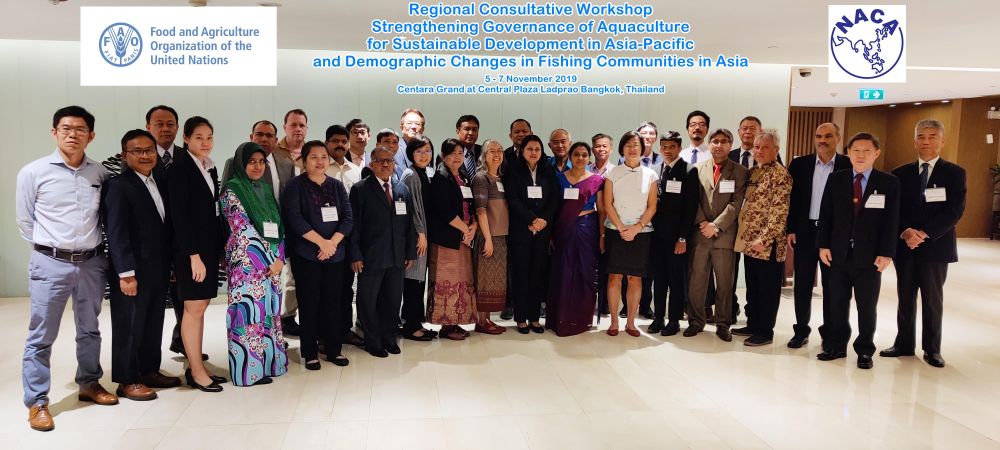Regional consultations on strengthening aquaculture governance and demographic changes in fishing communities
8 November 2019 | 3604 views | Bangladesh, Cambodia, China, Gender, India, Indonesia, Livelihoods, gender and social issues, Malaysia, Myanmar, Philippines, Sri Lanka, Thailand, Vietnam

Two consultations were held back to back in Thailand from 5-7 November, namely the Consultation on Strengthening Governance of Aquaculture for Sustainable Development in Asia-Pacific and the Consultation on Demographic Changes in Fishing Communities in Asia. The consultations were held at the Centara Grand Hotel at Ladprao, Bangkok. The consultations were attended by 29 participants from 15 countries in the Asia-Pacific region. The consultations were jointly organised by FAO and NACA.
Aquaculture governance
The rapid development of aquaculture in Asia is only a recent phenomenon of the past a few decades, and the industry is relatively new, with governance of the sector still evolving in many Asian countries in terms of both development of a legislative framework and enforcement of same. Good governance is fundamental and crucially important to tackle many of the issues that impair sustainable development of aquaculture, such as negative environmental impacts, low efficiency of resource utilisation, disease and food safety.
With the increasing world population and improving living standard as the result of overall economic growth, it is estimated that an additional 30 million tonnes of food fish has to be produced by 2030 to meet the increasing consumption demand. With most wild fish stocks fully or over exploited, aquaculture growth will be the major means of meeting increasing demand for food fish. However, it will be very difficult to achieve sustainable growth of aquaculture without improving the governance.
The 35th Session of Asia-Pacific Fishery Commission has identified the lack of effective governance as a major threat to sustainable aquaculture growth for greater contribution to achievement of the Sustainable Development Goals on ending poverty and hunger and achieving food security and improved nutrition. The commission recommended to FAO that it is timely needed to conduct a regional assessment on existing laws and regulations governing aquaculture and their enforcement in the region and a regional consultation on strengthening the governance of aquaculture.
The consultation and related country review studies were therefore proposed by FAO and jointly implemented by FAO and NACA in collaboration with member governments. The objectives of the consultation were to:
- Share the results of country studies on aquaculture governance in respective countries.
- Identify gaps, issues and challenges in aquaculture governance.
- Recommend strategies and actions to improve and strengthen aquaculture governance.
The consultation featured technical presentations from seven countries, namely Cambodia, China, India, Indonesia, Malaysia, Thailand and Vietnam. Audio recordings of the presentations are available for download or streaming from the NACA website.
Demographic changes in fishing communities
During the recently held 7th Global Symposium on Gender in Aquaculture and Fisheries, a presentation from Japan focused on the decreasing number of fishers and fish workers in fishing communities, both men and women, as well as the ageing population in these communities. The presentation also showed that the rate of ageing in fishing communities is higher than that of the national average. This presentation brought to the fore one of the least studied subject in fisheries, ie. the demographic changes in fishing communities and the implications these may have on the future of fishing, fisheries, the fishing industry, and social development of fishing communities.
In ASEAN Member States, it is projected that by 2035, the percentage of the population over 60 years old will be 21 percent in Brunei Darussalam; 12 percent in Cambodia; 15 percent in Indonesia; 9 percent in Lao PDR; 16 percent in Malaysia; 15 percent in Myanmar; 11 percent in the Philippines; 34 percent in Singapore; 30 percent in Thailand; and 20 percent in Vietnam. Cambodia will have a young and growing population whereas Thailand will have an ageing population. A few case studies were therefore carried out to look at demographic changes in small-scale fishing communities in Cambodia and Thailand in 2019 to understand potential implications on fisheries sustainability, migration patterns, climate change adaptation, and livelihoods diversification. The studies explored the general question: How are demographic changes affecting fishing communities? Specifically the studies tried to answer the following questions:
- What are the changes in demography (ageing, migration) in fishing communities?
- How are fishers adjusting their livelihoods with the changes in fishery resources as well as labour availability? Are they diversifying to other livelihoods?
- What are the consequences of these adaptation strategies? Are there any gender differences in the impact of such adaptation strategies?
- What are challenges faced and policy and program support needed for fishing communities for sustainable small-scale fisheries?
- The objectives of the consultation were to:
- Share the results from a literature review and demographic studies in Thailand and Cambodia, and demographic situations in other countries in the region.
- Identify the opportunities and threats in fishing communities under rapid demographic changes.
- Recommend strategies and actions to prepare fishing communities to adjust to the demographic changes.
The consultation featured presentations from eight countries, namely Bangladesh, Cambodia, India, Indonesia, Myanmar, Philippines, Sri Lanka and Thailand. The proceedings of both consultations will be published on the FAO and NACA websites in due course, and will be announced in a future edition of this newsletter.
Creative Commons Attribution.